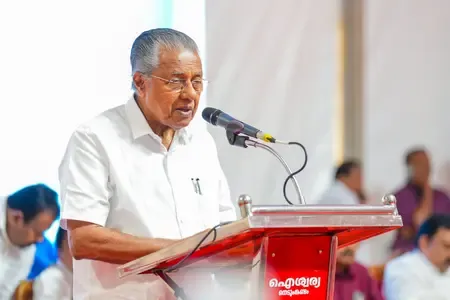Why is the Kerala government mandating Ministers to be addressed as 'Honourable'?

Synopsis
Key Takeaways
- The Kerala government has mandated that Ministers be called "Bahumanapetta".
- Critics question the constitutional validity of this directive.
- The emphasis on titles may detract from efficient governance.
- This move contrasts with trends towards simplification in democratic institutions.
- Upcoming Assembly sessions may address this contentious issue.
Thiruvananthapuram, Sep 10 (NationPress) The Kerala government has recently issued a directive mandating that Ministers be referred to as "Bahumanapetta" (Honourable) in all official replies to complaints and applications, according to officials.
The Personnel and Administrative Reforms Department published the circular on August 30, enforcing that Ministers' names must be prefixed with this honorific even in communication related to grievance redressal.
This circular, endorsed by an Under Secretary, has been disseminated to all government departments, district collectors, and heads of offices, instructing them to ensure adherence to this new protocol.
Officials responding to complaints or applications directed to Ministers are also required to comply with this rule, the circular stated.
The initiative has ignited fierce criticism, raising concerns about its constitutional legitimacy.
Article 18 of the Constitution abolishes titles, save for military or academic distinctions, which reflects the framers' vision that respect for leaders should arise from their service and behavior, not from obligatory honorifics.
Critics assert that compelling citizens to use "Bahumanapetta" when filing complaints signifies a regressive mindset and undermines the essence of constitutional democracy.
Observers note that this directive emerges at a time when judicial and legal systems across India are moving away from colonial-era practices laden with excessive honorifics.
Senior bureaucrats indicate that the Kerala government's order appears to contradict the trajectory of reform.
"Instead of concentrating on efficiently addressing complaints, the focus has shifted to preserving ministerial prestige," commented a former official.
Critics caution that such mandates could alienate the general public by favoring protocol over accountability.
The controversy has ignited a broader conversation regarding the appropriateness of mandating respect through titles, especially as democratic institutions globally are consciously moving toward simplification and equality in official interactions.
Attention is now directed toward the upcoming Assembly session, commencing next week, to see how the Congress-led Opposition will tackle this issue, as they have consistently criticized Chief Minister Pinarayi Vijayan for his autocratic governance style.






